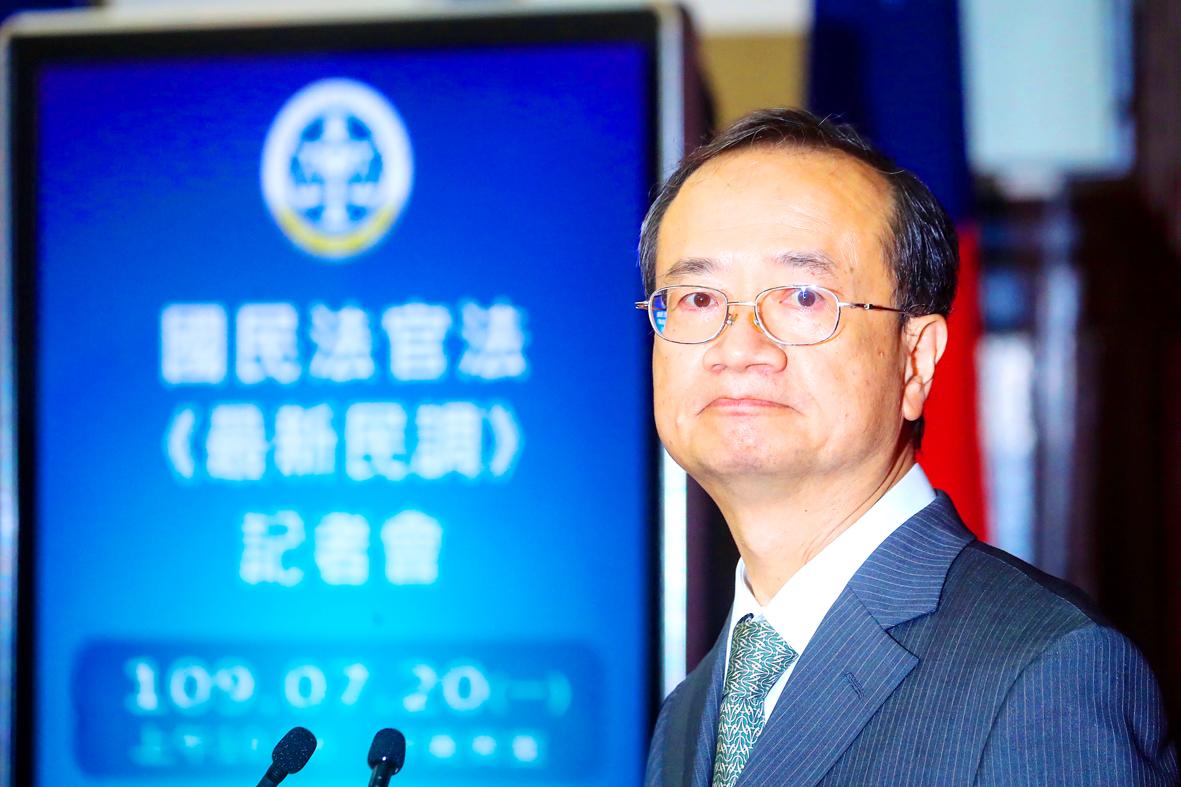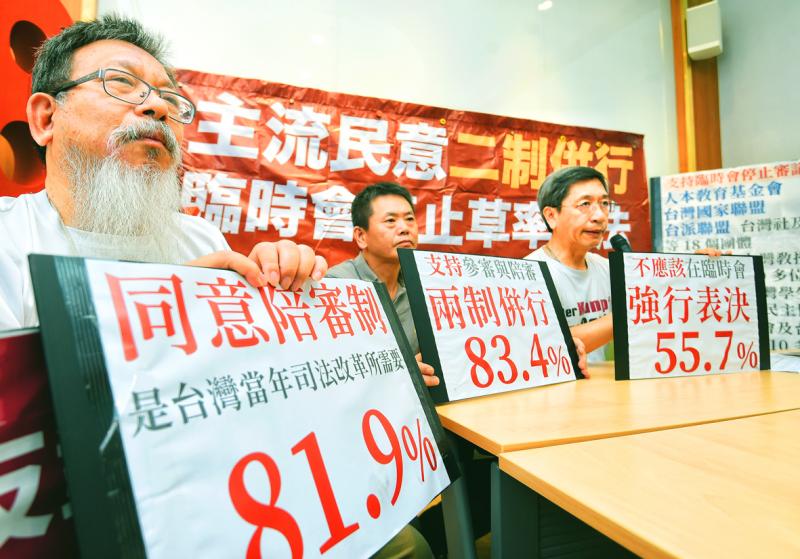Lawmakers yesterday in an extraordinary legislative session began reviewing the Judicial Yuan’s proposed bill for citizen participation in criminal court procedures and passed a second reading to rename the proposed “citizen participation in criminal trial procedures act” to the proposed “national judge act.”
The proposed lay judge system would comprise three professional judges and six citizen judges, and operate on a “joint deliberation and joint ruling” model.
Lawmakers later in a 54-18 vote approved a motion raised by the Democratic Progressive Party (DPP) caucus to continue the review meeting until midnight.

Photo: CNA
Earlier yesterday, the Judicial Yuan released a survey that showed most people were in favor of a lay judge system.
According to the poll, 72.91 percent of respondents agreed that having citizens discuss criminal trials with judges could result in verdicts that are consistent with the law and that meet people’s expectations, Judicial Yuan President Hsu Tzong-li (許宗力) said, adding that more than 80 percent approved of having professional judges attend final deliberations to decide on a ruling.
More than 94 percent of respondents said that in criminal trials using a lay judge system, the ruling should provide the reason for the verdict, while 97 percent said defendants should have the right to appeal rulings, he added.

Photo: Fang Pin-chao, Taipei Times
“The survey shows that a large majority of the public supports citizens working together with judges under the ‘joint deliberation and joint ruling’ model. In comparison, typical jury systems in principle do not allow appeals, and have no requirement to submit reasons for the verdict,” Hsu said.
“There is no perfect way, nor a most advanced judicial system. The one that can best adapt to our native environment and judicial framework, which comes closest to fulfilling people’s expectations ... is the Judicial Yuan’s lay judge system, which right now is best suited to the nation’s needs and the public’s demands,” he added.
The survey was conducted by the ERA Survey Research Center from July 10 to Tuesday last week. It collected 1,074 valid responses and has a margin of error of 3 percentage points.
However, another survey released yesterday by a group of legal reform advocates showed that 81.9 percent were in favor of a jury system, 63.2 percent supported a lay judge system and 83.4 percent backed a “twin track” proposal.
The survey was conducted by the Taiwanese Public Opinion Foundation on Monday and Tuesday last week. It gathered 1,078 valid responses and has a margin of error of 2.98 percentage points.
“The DPP government repealed its party charter by excluding the jury system and ran contrary to the prevailing views of Taiwanese. We hope lawmakers will not pass [the proposal’s] third reading,” Judicial Reform Foundation chairman Lin Yung-sung (林永頌) told a news conference.
The survey results released by the Judicial Yuan “looked like a paid promotion,” Lin said.
“The DPP often uses extraordinary legislative session to deal with major bills, as no subcommittee meetings or public hearings are held, with only lawmakers voting. This is the ruling party’s arrogance and the majority bullying the minority in the legislature,” Chinese Nationalist Party (KMT) caucus whip Lin Wei-chou (林為洲) told the same news conference.
Taiwan People’s Party Legislator Jang Chyi-lu (張其祿), who also attended the news conference, accused the DPP of using “violence of majority vote” to run roughshod over opposition parties.
“Taiwanese have pursued a jury system for more than a century. We hope the DPP can stop its actions, as it should not force through a bill during the current session without a full deliberation process,” New Power Party caucus whip Chiu Hsien-chih (邱顯智) said.
Additional reporting by Hsieh Chun-lin

The manufacture of the remaining 28 M1A2T Abrams tanks Taiwan purchased from the US has recently been completed, and they are expected to be delivered within the next one to two months, a source said yesterday. The Ministry of National Defense is arranging cargo ships to transport the tanks to Taiwan as soon as possible, said the source, who is familiar with the matter. The estimated arrival time ranges from late this month to early next month, the source said. The 28 Abrams tanks make up the third and final batch of a total of 108 tanks, valued at about NT$40.5 billion

Two Taiwanese prosecutors were questioned by Chinese security personnel at their hotel during a trip to China’s Henan Province this month, the Mainland Affairs Council (MAC) said yesterday. The officers had personal information on the prosecutors, including “when they were assigned to their posts, their work locations and job titles,” MAC Deputy Minister and spokesman Liang Wen-chieh (梁文傑) said. On top of asking about their agencies and positions, the officers also questioned the prosecutors about the Cross-Strait Joint Crime-Fighting and Judicial Mutual Assistance Agreement, a pact that serves as the framework for Taiwan-China cooperation on combating crime and providing judicial assistance, Liang

A group from the Taiwanese Designers in Australia association yesterday represented Taiwan at the Midsumma Pride March in Melbourne. The march, held in the St. Kilda suburb, is the city’s largest LGBTQIA+ parade and the flagship event of the annual Midsumma Festival. It attracted more than 45,000 spectators who supported the 400 groups and 10,000 marchers that participated this year, the association said. Taiwanese Designers said they organized a team to march for Taiwan this year, joining politicians, government agencies, professionals and community organizations in showing support for LGBTQIA+ people and diverse communities. As the first country in Asia to legalize same-sex

MOTIVES QUESTIONED The PLA considers Xi’s policies toward Taiwan to be driven by personal considerations rather than military assessment, the Epoch Times reports Chinese President Xi Jinping’s (習近平) latest purge of the Chinese People’s Liberation Army (PLA) leadership might have been prompted by the military’s opposition to plans of invading Taiwan, the Epoch Times said. The Chinese military opposes waging war against Taiwan by a large consensus, putting it at odds with Xi’s vision, the Falun Gong-affiliated daily said in a report on Thursday, citing anonymous sources with insight into the PLA’s inner workings. The opposition is not the opinion of a few generals, but a widely shared view among the PLA cadre, the Epoch Times cited them as saying. “Chinese forces know full well that